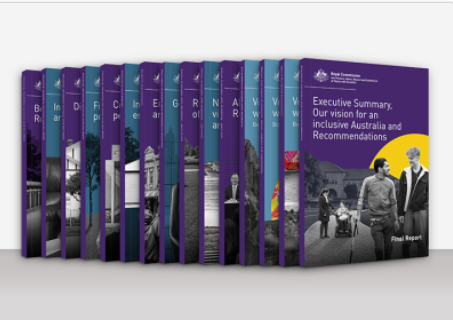What does the Royal Commission say about the NDIS?

On Friday 29th September the Final Report of the Royal Commission into Violence, Abuse, Neglect and Exploitation of People with Disability was presented to Parliament. Over 12 volumes, there are 222 recommendations of ways to promote an inclusive society that supports the independence and rights of people with disability. We want to thank everyone who contributed to the Royal Commission over the last 4 and a half years.
The Royal Commission has made some big recommendations. Three key changes that follow are :
- A disability rights act to enshrine international human rights into Australian law. The Act should reflect the UN Convention on the Rights of Persons with Disabilities and ensure that any policies or major changes impacting people with disability are done in consultation with the disability sector.
- A new National Disability Commission. This would be an independent statutory body run by a person with disability. Its role would be to ensure the Disability Rights Act is enforced correctly and ensure positive outcomes for the lives of people with disability.
- A federal government portfolio for disability, with a dedicated minister
But what does the report say specifically in relation to housing, support and the NDIS? Here is a quick overview:
Improve access to alternative housing options
There needs to be more accessible and affordable housing options for people with disability. The NDIA should research where and how people with disability want to live and consider this when developing new projects. Participants wanting to move between supported accommodation should be supported to do so by independent advocates and support coordinators. NDIS home and living funding (Supported Independent Living, Specialist Disability Accommodation and Individualised Living Options) should be simpler and more flexible.
Phase out group homes
5 out of 6 Commissioners recommended an end to group homes, of which, 4 recommended a 15-year plan to close group homes entirely. The plan includes assessing the current availability of alternative housing, supporting people to live in individual homes and piloting alternative housing models to meet future housing needs. According to this recommendation, building of group homes should stop within two years and transitioning people into group homes should stop within five years. Supporting people to find individual housing will reduce their exposure to neglect and abuse. The plan would not force people to move out of their group home if they don’t want to.
Embedding human rights
Disability service providers should prioritise human rights when designing and delivering services. They should be supported to do this by a capacity-building program commissioned by the NDIS Quality and Safeguards Commission. The way that services are delivered should be codesigned with people with disability, disabled people’s organisations, and disability representative organisations.
The role of support coordinators and independent advocates
Participants should not receive other services from the same organisation that provides them with support coordination. Participants at a heightened risk of violence, abuse, neglect or exploitation, particularly those living in supported accommodation, should receive funding for support coordination. Participants living in supported disability accommodation should be connected to an advocacy organisation.
Choice and control over how services are delivered
The National Disability Insurance Scheme (Quality Indicators for NDIS Practice Standards) Guidelines 2018) should reflect that Participants have the right to be adequately supported to make informed decisions about the support they receive. Participants should also be supported to communicate their decisions and goals.
A national disability support worker registration scheme
It was recommended that a national disability support worker registration scheme be established by 1 July 2028. This would mean mandating the NDIS Worker Screening Check for all disability support workers and establishing a code of conduct and minimum standards for registered disability support workers, including support coordinators. According to this recommendation, the scheme should consider accreditation of workers’ qualifications, experience, capabilities and skills and be co-designed with people with disability, disabled people’s organisations, and disability representative organisations.
We were disappointed that this section of the report did not include the perspectives of people with disabilities. To uphold the principles of choice and control, it will be essential that such a scheme provides NDIS participants with the option to choose who supports us, including the right to engage workers who may not be registered with the scheme, if that is our choice.
Provider of last resort
The Australian Government should ensure there are service providers available to people in crisis situations, people at risk of losing their accommodation and disability services, people whose needs cannot be adequately met by existing services and people living in remote areas.
What happens next?
The federal government is setting up a taskforce to coordinate its response to the report. It is recommended Federal, state and territory governments should each publish a written response to the Final Report by 31 March 2024.
If you need support, you can contact:
- Lifeline- 13 11 14
- 1800Respect – phone 1800 737 732
- Beyond Blue- 1300 224 636
- QLife- 1800 184 527
- 13Yarn- 13 9276

Join the conversation